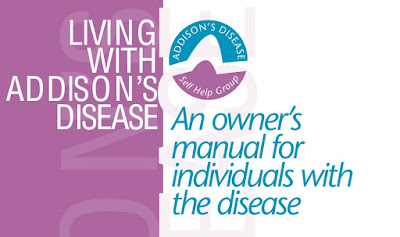I am so happy to see this article. Addison's is the opposite of Cushing's. Addison's results from low cortisol levels, and Cushing's results from high cortisol. When a Cushing's patient has a pituitary tumor removed, s/he can suffer from Addison's while the body's hypothalamus-pituitary-adrenal axis regulates itself again. Also, a Cushing's patient who will not stop producing cortisol ultimately has to remove both adrenal glands in order to ultimate stop all cortisol production. This makes the Cushing's patient an Addison's patient for the rest of his/her life. These diseases are inextricably linked, and I am glad that doctors are realizing how life threatening cortisol can be. Patients know it. European doctors know it. Let's hope US doctors will learn quickly, too. ~m
Greater Awareness Needed On Risks That Addison's Disease Poses To Patients
Main Category:
Endocrinology
Also Included In:
Infectious Diseases / Bacteria / Viruses
Article Date: 03 May 2011 - 0:00 PDT
http://www.medicalnewstoday.com/articles/223926.php
Two new studies presented at the European Congress of Endocrinology in Rotterdam show the possible dangers facing patients with
Addison's disease are higher than previously thought. The new research shows that Addison's patients, who have low levels of cortisol produced by the adrenal glands, are more likely to get infections which may provoke life-threatening adrenal crises.
Addison's disease is caused by low levels of the hormone cortisol, produced by the adrenal glands. Without treatment, the condition can be fatal. Patients with Addison's disease can suffer a range of symptoms, including
fatigue, dizziness, weight loss, muscle weakness, mood changes and the darkening of regions of the skin if they don't receive treatment. The most famous Addison's disease sufferer was John F Kennedy, but it is a comparatively rare condition, affecting about 1 person in 15,000.
Dr Stefanie Hahner, working at University of Würzburg, Germany, looked at the incidence of adrenal crisis in 472 German patients with Addison's disease. An adrenal crisis is a potentially life-threatening condition which occurs when cortisol levels fall dangerously low, requiring an immediate injection of hydrocortisone. Dr Hahner found that 62 of the patients had an adrenal crisis over the two-year period of the prospective study, with almost two-thirds of those needing to be hospitalised and 9.5% being treated in intensive care. Two patients died from adrenal crises during the study. The study also found that many patients were unprepared to deal with the threat to life presented by crises and further patient education programmes may be warranted.
Researcher Dr Stefanie Hahner said:
"The number of adrenal crises was higher than we expected from previous studies. Infectious disease provoked 39% of the crises, with psychological
stress also causing problems. Ninety-five percent of the patients were aware of the dangers of an adrenal crisis, but only 28% had the emergency injection set. This shows that these crises are largely caused by infectious diseases and stress, but also that patients need to be better prepared to respond to the crises when they arise and that infectious disease has to be treated early and aggressively in this patient group."
In another study presented at the European Congress of Endocrinology from the University of Utrecht, The Netherlands, Dr Lisanne Smans showed that patients with Addison's disease were more at risk of suffering infections than the rest of the population.
She identified 390 Addison's patients from pharmacy records and compared the risk of infections and hospital admissions. Dr Smans found that the risk of infectious disease was 1.5 times that of a control population, (overall incidence rate of 59.2/100 person-years). In addition, Addison's patients were significantly more likely to be hospitalised for infectious disease than control groups (3.8/100 person years for Addison's patients, versus 0.8/100 person years for control groups).
Researcher Dr Lisanne Smans commented:
"We need to raise awareness amongst doctors and patients of the risk of infections in Addison's patients compared to the general population. We now want to move on to see whether
influenza vaccinations can help this patient group."
Commenting on the two papers, Professor Peter Trainer, Chair of the European Congress of Endocrinology Programme Organising Committee, said:
"These studies reinforce our knowledge of the risks that infections pose to patients with Addison's disease and serious consequences that can arise. We need to look at ways of making both the medical community and patients more aware of the appropriate medical action needed to treat an adrenal crisis. This really is a case where quick action can save lives. All patients with Addison's disease should carry an emergency kit containing a hydrocortisone injection that can be given immediately if they fall ill."
Sources: European Society of Endocrinology,
AlphaGalileo Foundation.


